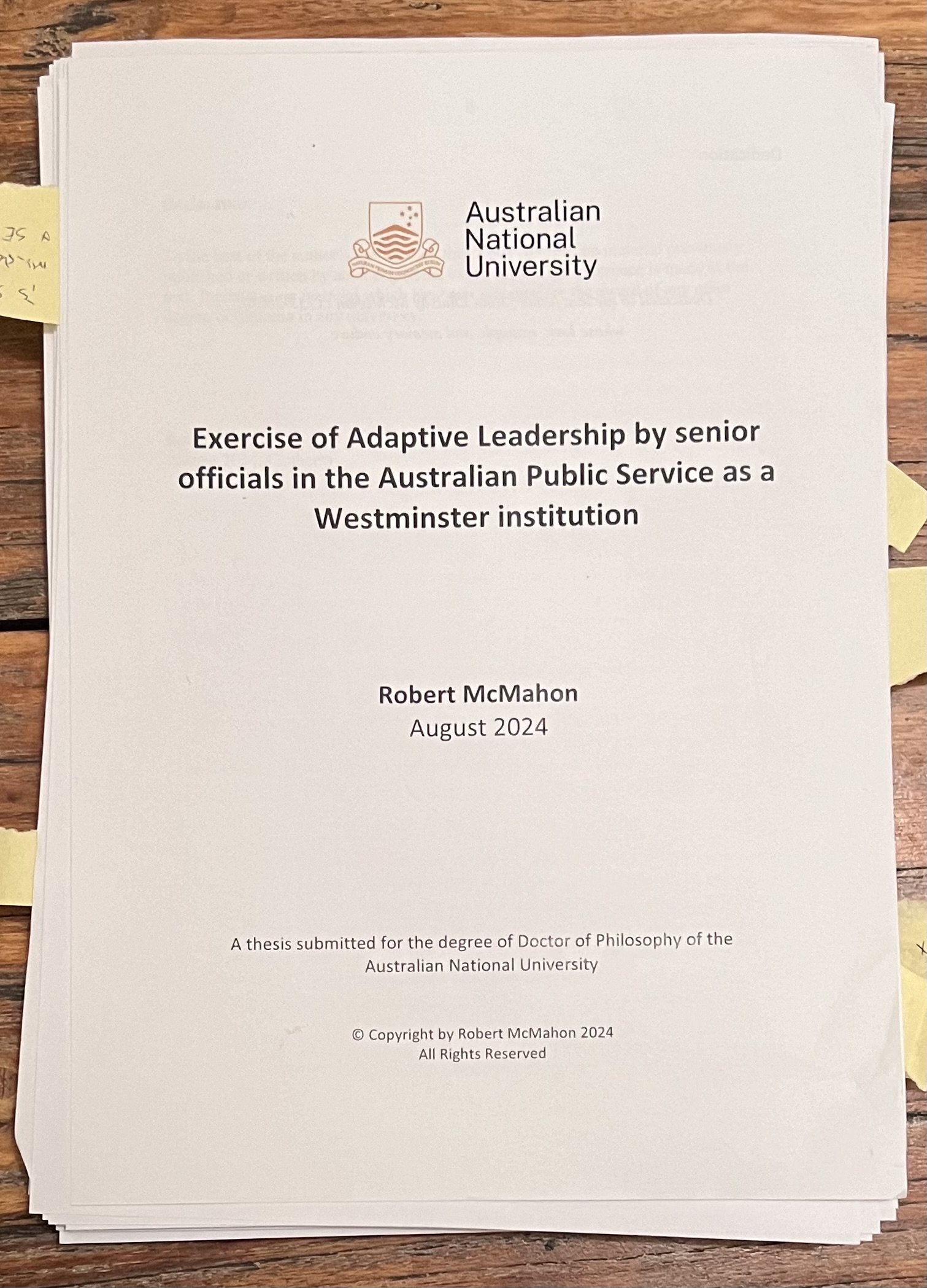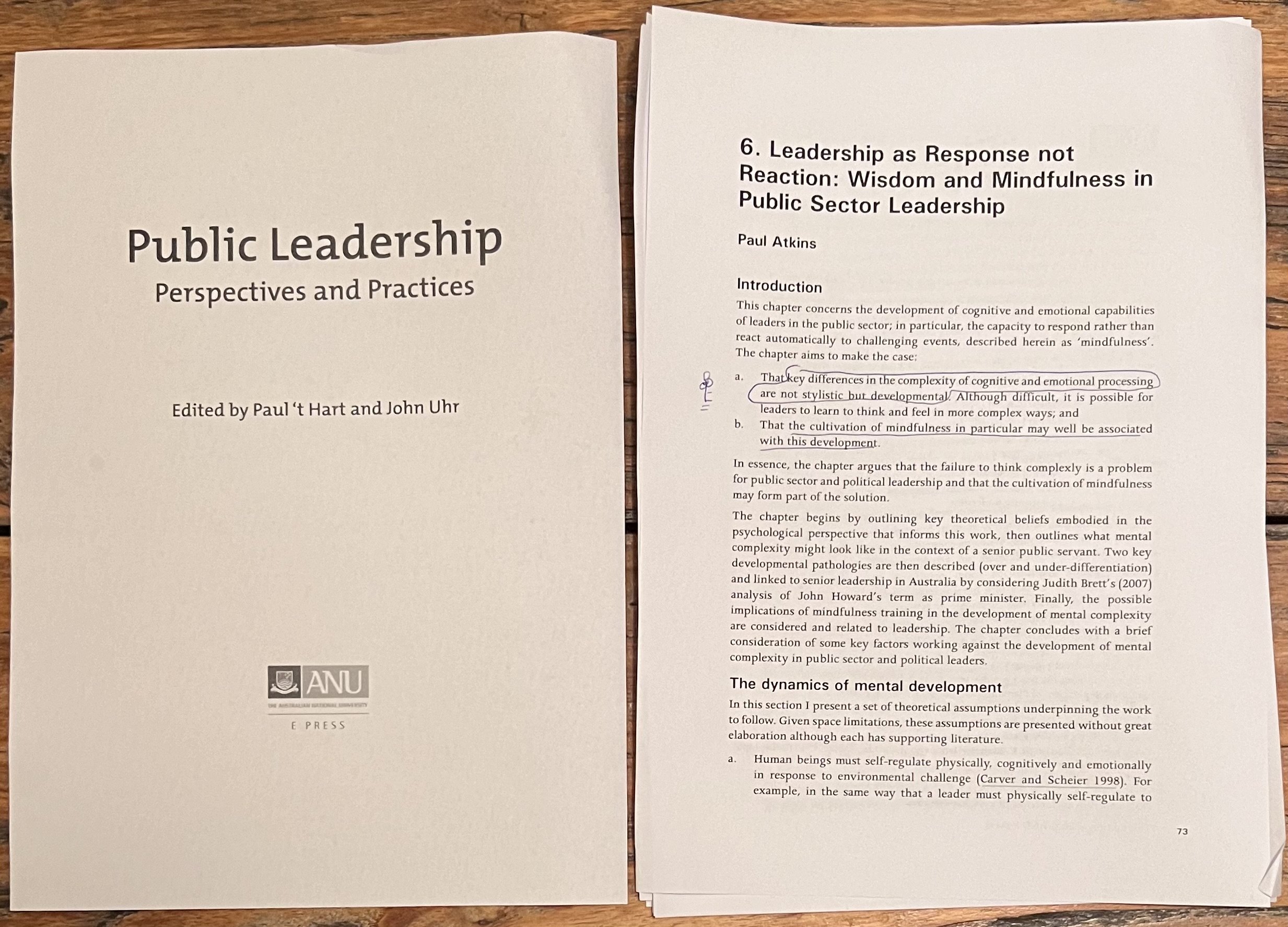Why we need mindful leaders: Insights from the research
I study leadership. And I research and practice the techniques for developing leadership. I’ve done so across my career. In my quest to make the world a better place, this is, in my opinion, as ‘up-stream’ as I can get. I have seen, and deeply know, that if leaders can access their most skilful self, that everything else they do, and every good intention they have, has a better chance of coming to fruition.
This passion, has driven my career, and led me to my work as a public servant in the development and facilitation of leadership programs on behalf of the Leadership team of the Centre for Leadership and Learning within the Australian Public Service (APS) Commission.
‘an environment of learning’
Centre for Leadership and Learning
In that role, I taught various elements of leadership to Senior Executive Service (SES) officers and other leaders across the APS. Whether it was understanding of the governance frameworks and legislation of the public service, or the micro-skills which were deemed essential for leadership within the public service, I taught and coached SES and other leaders as they prepared for the many challenges of leading public sector work. This included the intersection of APS work and the work that is done in the various Ministers’ Offices - i.e. the Government (to whom the APS serves).
Across this time, I kept returning to the work of many academics and practitioners who studied public service, political leadership, and the intersection between these and mindfulness. These dedicated academics have grown to be my inspiration, coming from across the globe, including many who reside here in Australia. Their work fascinated me, and combined with the benefits my own training and experience in mindfulness had given me, I have been committed to the work of research and promotion of the benefits of mindfulness in Australia’s Westminster style public and political service. My speciality is now in looking at how the research on mindfulness translates, applies, and is echoed by research in leadership development and management for the highly pressurised environments of the APS and Political spheres.
The research into the benefits of mindfulness approaches has been fairly well established in:
medicine (notably starting with Jon Kabat Zinn’s Mindfulness Based Stress Reduction (MBSR) in 1979, and in
the private sector in programs such as Google’s 2007 Search inside yourself Leadership Institute, and even in
those serving in the Government services, such as British MP, Chris Ruane, US Representative, Tim Ryan, Swedish MP Anne-Marie Borden, Finnish Diplomat Terhi Bunders, and many others as is shown through the work of The Mindfulness Initiative’s Mindfulness All-Party Parliamentary Group in the UK.
Mindfulness All-Party Parliamentary Group
MIndfulness and a leader’s need to Sustain Attention:
In his 2024 Doctoral thesis, Dr Robert McMahon researched how senior officials in the APS as a Westminster institution exercised the practice of Adaptive Leadership. His insights included those arising from his interviews of 39 political and administrative elites including Prime Ministers, Cabinet ministers, Departmental Secretaries, and 48 other SES Officers from SES Band 3 to SES Band 1’s, as well as a number of case studies including a number of notable inquiries into the APS from 2005, 2014, and 2023.
In his thesis, McMahon points out that,
“In environments which emphasise often short-term ‘deliverables’ and ‘key performance indicators’, generating support for the work necessary to uncover, decipher, and solve adaptive challenges... can be difficult. Yet...sustained attention is necessary to diagnose and address an...adaptive challenge...”
While the research shows that the ability to direct and sustain one’s attention is critical for public sector leaders to address adaptive challenges, the literature also shows, that directing and sustaining one’s attention is not something that people are skilled in.
In their 2010 research Harvard psychologists Matthew A. Killingsworth and Daniel T. Gilbert enlisted 2,250 volunteers, and using an iPhone web app that contacted them through their days, discovered that people spend approximately 47% of their time not thinking about the actual moment that they are in.
The research demonstrated the prevalence of a wandering mind in a person’s life. It also showed that an individual’s levels of happiness are negatively impacted by this mind-wandering, regardless of the activity they were engaging in.
MIndfulness and a leader’s Cognitive and emotional processing:
In their book, Public Leadership: Perspectives and practices (2008), Paul ‘t Hart and John Uhr included a chapter by Dr Paul Atkins titled Leadership as Response not Reaction: Wisdom and mindfulness in public sector leadership.
Dr Atkin’s research hypothesised that,
“Cultivating mindfulness allows us to self-regulate more effectively and, from a mindful vantage point, leaders are better able to respond rather than react, and to learn from, rather than avoid challenge. ”
Dr Atkins’ research looked across a growing body of evidence from the studies of psychological flexibility and performance, and its impact on a public sector leader’s ability to process insights and emotions.
This ability to be able to free one’s self from a habitual reaction, and move toward a more conscious response is critical for senior public sector leaders and politicians alike. In their 2010 book, Learning to be a Minister: Heroic expectations, practical realities, Tiernan and Weller capture essential lessons on how a new ministry would learn and adapt to responsibilities of governing. Across a number of years, they researched and spoke with then current and former ministers, ministerial staffers, and senior officials. Of the insights captured, the ability for a minister to adapt and understand the various roles they play was highlighted as important.
“Ministers effectively have a mix of roles, all of which they must take into account most of the time”
The roles spanned from the highly political minded role to their constituency, to their political party, to the parliament itself to the more administrative roles involving public announcements via the press, to their work as a Cabinet member, or the government official to whom their public sector agencies serve.
The ability to move between the roles demands the ability to mindfully respond rather than habitually react, especially when working in highly pressurised environments.
(Some of the micro-skills from mindfulness as applied to the health sector are discussed in this Insightful Interview with Dr Sharee Johnson, author of The thriving doctor: How to be more balanced and fulfilled, working in medicine)
The traditional way of governing must change
In his 2016 book, How to run a government: So that citizens benefit and taxpayers don’t go crazy, world leading expert on government delivery, education systems, systemic innovation and education reform, Sir Michael Barber, (the founder of the first Prime Minister’s Delivery Unit in No. 10 Downing Street) noted that,
“...if our governments and public services are to provide the services and regulation on which our prosperity as individuals and as a global community depends, their cultures and processes will have to change. ”
Using case studies from across the globe, Barber illustrates over 50 ‘rules’ for ensuring governments can deliver more effectively. Notably one of these rules is to,
“Understand in your head (and feel in your heart) the gap between your aspiration and the unvarnished reality”
This is a part of the change that Barber refers to. The ability to do this was recently investigated through a piece of 2020 research, published in Europe’s Journal of Psychology, by Klussman, Curtin, Langer and Nichols. They provided a theoretical framework to build self-connection - or the ability for an individual to grow their awareness of self, accept what they see in the ‘unvarnished reality’ that Barber alludes to, and use this to align their behaviours with their aspirations. Their ideas were closely connected to the frameworks of mindfulness and authenticity, and can, I’ve found, be remembered by the idea that a mindful awareness, plus acceptance can enable values driven behaviours.
‘introducing the Practice of mindfulness to public servants’
You can develop your mindful leadership skills
In his 2019 paper, Mindfulness in politics and public policy, research fellow Jamie Bristow, in his role as clerk to the All-Party Parliamentary Group on Mindfulness, outlined how he saw mindfulness helping parliamentarians with the following:
Attention: better ability to concentrate enabling the absorbing multiple briefings, 24-hour newsfeeds, social media, debates, committees, work with constituents, etc.
Impulse control: Ability to respond, not react which helped a more conscious behaviour within the public eye.
Kindness: Ability to empathise with the public, constituents, and others.
Understanding the quality of their thinking, or thinking about their thinking: The ability to see their own reactive habits and biases.
Jamie’s work has since given him the opportunity to teach and advise courses at the Universities of California, Harvard, and Oxford, as well as having collaborated with the United Nations, US Government, and British Parliament, and legislatures across the world, corporates, NGOs and academia.
Mindfulness can inform how you build your leadership skills
“Politicians I see here... are actually trying to do what they think is the right thing...the vast majority of people here are really trying to do the best as they see for the country.”
In August of 2023, I interviewed Australia’s Senior Water Advisor, Mr Michael Wrathall. In our conversation, he shared his insights and observations on what it is like working ‘behind the scenes’ in parliament, and the many, many people within the parliament from across the political spectrums, who are there to do what they think is important.
These values to serve the greater good, however, require one to build the skills of their trade. The ‘public sector craft’ or metrics for outstanding political leadership. Thankfully, these hard skills, behaviours and practices are known. I recently posted on this, and the work of the McKinnon Prize - an Australian prize for outstanding political leadership. For Senior Public Servants, the metrics of good performance are already laid out though the Integrated Leadership System (ILS). I’ve found the work from the Centre for Leadership and Learning on the Self-Assessment to be valuable here, as exampled by this self-assessment tool for SES Band 1’s.
Within both sets of metrics (political through the McKinnon Prize, or public sector through the ILS, there are multiple micro-skills which can be improved through the practice of mindfulness. And while there is debate about how much practice of these skills is required to receive benefit (Bowles, Davies, Strohmaier, Galante, & Van Dam, 2023), it has been generally accepted that daily, or near-daily practice of the skills of mindfulness is advised to achieve results. It is not, as so many practitioners and researchers have said, an ‘easy skill’ to practice - as one is often confronted with realisations that may be uncomfortable - yet essential to respond to (rather than blindly react to).
Thankfully, there are a number of well known techniques and frameworks that can assist political or public service leaders to build their familiarity and skills at being a more insightful and mindful leader.
The question is, if you are a leader, either in politics, or the public service, what are you doing to build your mindful leadership presence? What are you doing to understand and benefit from the research on how mindfulness can enhance your work and your ability to thrive doing it?
If you are interested in learning more about how this fascinating and practical study of the mind (through mindfulness) can help you - why not reach out today? Your path to a more mindful future awaits.
A rising full moon over our nation’s capital
James Samana is a member of the Australian Expert Panel of the Global Mindfulness Initiative, and writes this post to help bring awareness of the work being done in this space to help leaders across the globe to build a more mindful presence in their work and life for the benefit of all.






